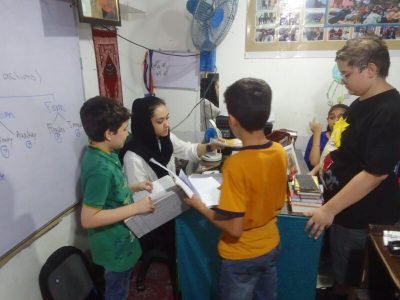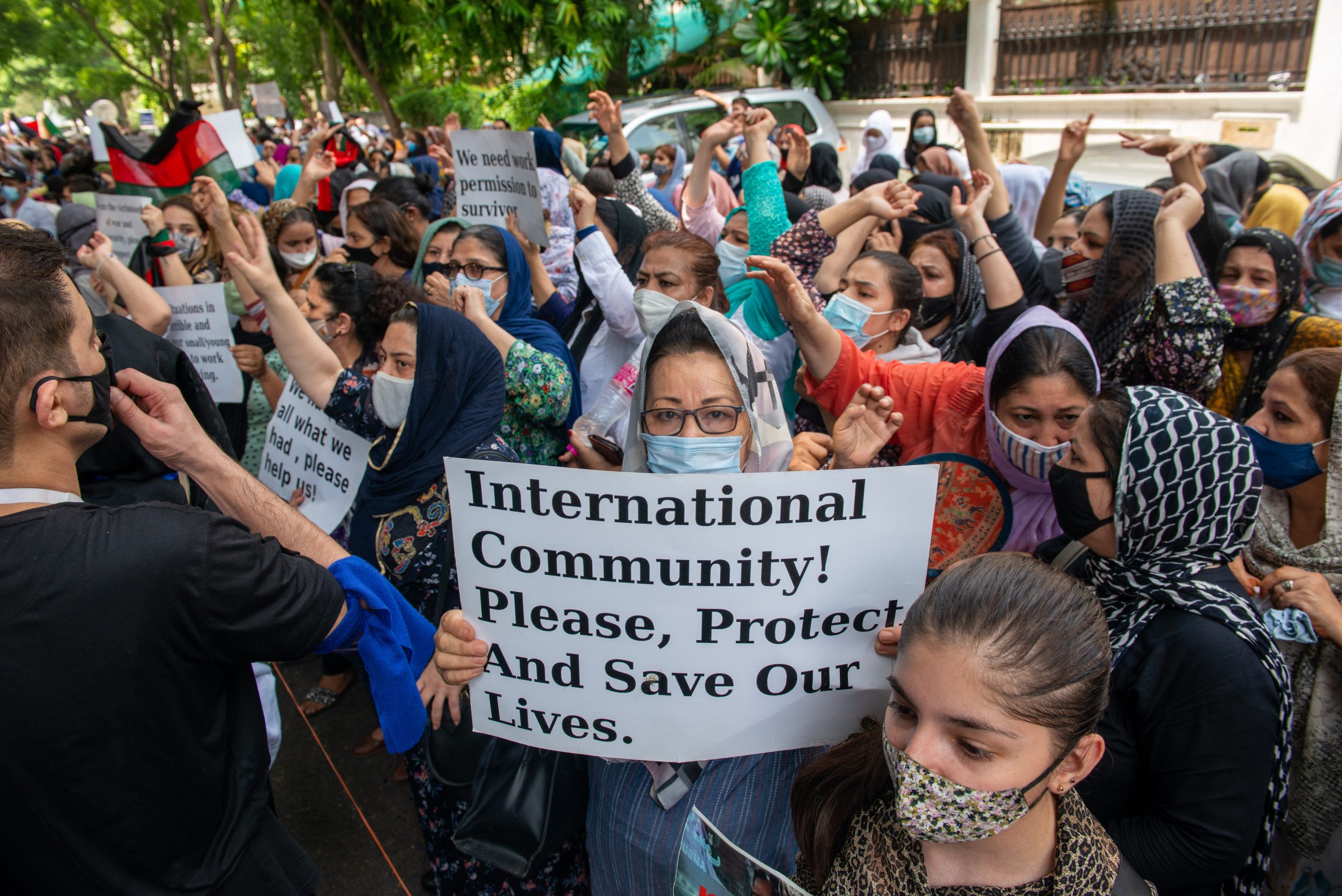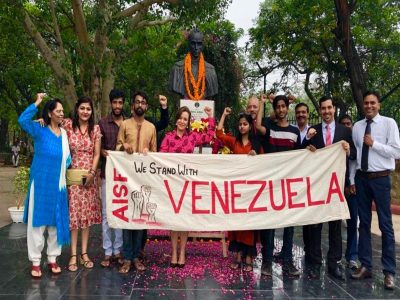The teachers of Sayed Jamaluddin Afghan High School are struggling for as little as two square meals a day after the only Afghan institution for primary and secondary education in the national capital was shut down completely in September, 2023 following the closure of operations at the Embassy of Afghanistan.
“If we live in a jail, we can at least get two meals a day easily. But here we have no food and may soon be without a roof. An Indian neighbour sometimes gives us bread and food. I can’t tell you how we are surviving,” said Nazia Samadi, a teacher at the school, to Patriot.
The school had 15 teachers and around 150 students from the Afghan community while it was in operation. After its closure, the students had no alternative except to stop their education.
Nazia, who has been living in Bhogal since 2016 with her two sisters, one of whom lost her job during lockdown, is also struggling to pay her house rent.
“We are surviving on other people’s help. We once received ration from an NGO run in collaboration by Don Bosco and UNHCR. The flat owner’s behaviour is also not good. He asks us to leave if we don’t pay rent on time. If I go to ask for a job somewhere, they ask for documents like bank account and pan card. But as refugees we don’t have any.”
Nazia, who is disabled and an orphan, added, “The salary from school was of great help to us. But I have not received salary for the last nine months. If the dues are released, they will help us survive for a few months. I am also concerned about my youngest sister, who is just 7, and want her to continue with her studies.”
All prayers for help seem to be falling on deaf ears.
“We asked for help from the Afghan Committee, which is the representative body of the community in India, but they said that their situation is also bad. The Indian government should think something about us. We are hoping that UNHCR will do something for us like resettlement.” Nazia said.
Until 2021, the school was supported by the Afghan government but after the Taliban took over, funding stopped, impacting the salaries of teachers, rent and other expenses.

The Indian government stepped in with some support but after the embassy stopped operating, they withdrew the decision to fund, leaving teachers and students in the lurch and facing uncertainty.
Mehboba Noor, 38, also taught for over five years but is now struggling to survive.
“I was teaching there for five years. I couldn’t get my salary for seven months. Now I give tuitions to survive and earn Rs 8,000 a month. All of us are in big trouble,” said Mehboba, who has been living with husband and three children in Bhogal.
She is now looking for a way to move out of India.
“Our future is uncertain. My kids also study here, but they cannot go to other schools in India due to age and language barriers. Many Afghans are shifting to other countries from India. If we get a chance to go to Canada and Australia, then we will also shift,” said Mehboba.
She is, however, getting some help from relatives.
“Sometimes my brother, who is in Australia and my brother-in-law from USA, help me pay rent because my husband is also unemployed.”
Teachers of the school told Patriot that most Afghan students are not fluent in Hindi or English. They can only understand and have difficulty in writing.
Admission to Indian schools is tough for them. Age criteria is also a hurdle during admission.
“Afghan students from first to fifth are allowed admission to Indian schools but those above are not allowed. So around 150 students are sitting at home. Some of the students asked us what they should do now after the closure of school since they can’t afford private tuition,” Mehboba said.
“[After funding from the Afghan government stopped], GOI (Government of India) helped the embassy, which in turn helped the school. However, once activities of the embassy were stalled and its work was handed over to the Hyderabad and Mumbai consulates, problems started arising in the school.”
Mehboba wants the government to restart the school.
“I request GOI to restart our school,” said Mehboba.
Unemployment is also a problem among Afghan people here. Many people told Patriot that Afghans are moving to other countries due to financial problems.
Geeta Ghafoori, 36, is another one suffering.
She has been living in Delhi for a decade and taught in the school for one year.
“I was surviving on the school salary and home tuition. But now we are struggling to survive. My husband is also unemployed. They did not even pay our seven months’ due salary,” she told Patriot.
The teachers had lodged a protest at the embassy but since it is shut now, there seems to be no one to address the complaint to.
“Earlier, we protested at the embassy for the salary. They promised to give us but didn’t. Now we are barely surviving. Even if our kids demand something, we are unable to fulfil it.”
Geeta, who was a lawyer in Kabul, lives with husband and three daughters in Bhogal.
“Our future is completely unstable. We don’t know what will happen,” she said painfully.
The decision to close the school has also left the future of hundreds of students in a limbo. They are unable to continue their studies and have no option but to stop their studies.
Yusuf, 14, is one of them and dreams of becoming an engineer.
“I felt very bad after the school stopped. I am unable to go to an Indian school due to language problems. I can’t write Hindi. So, my studies are getting affected,” said Yusuf, a class eighth student of the school.
The family’s financial crisis doesn’t allow him to even attend tuition classes.
“Studying at home is also not easy, we get bored being at home all the time,” he said further.
“The studies of my two younger brothers, who read in class 2 & 5, have also been affected. We want our school to restart.”
Humaira Naderi, 19, is a class 12 student in the school and faces a similar problem. Her documents, certifying that she is a refugee, are also stuck in school so she is unable to do anything.
“I have been studying in the school since 2017, when I was in class 6. In September, the teacher said that the school is closing for some time. But it seems to have shut permanently,” she lamented to Patriot.
“I was devastated. I need documents because without them, I can’t take admission anywhere. My dream of becoming an engineer is hanging in the balance. My parents are also concerned about my studies. I want to continue studying but don’t know how,” she said further.
Mudassir, 14, who has lived with his mother and siblings in Bhogal since 2016, said that tuition classes don’t have the same impact as attending school has.
“We received a message in the WhatsApp group about the school shutting down. After that I took tuition classes to focus on studying. But I am still waiting for the school to reopen,” Mudassir said.
Mohammad Qais Malikzada, the chief of Afghan Committee, told Patriot that he attended a meeting with the new counsellor-general in the Embassy of Afghanistan in Delhi on November 28 and raised the matter.
“They have promised to settle it,” he said.





